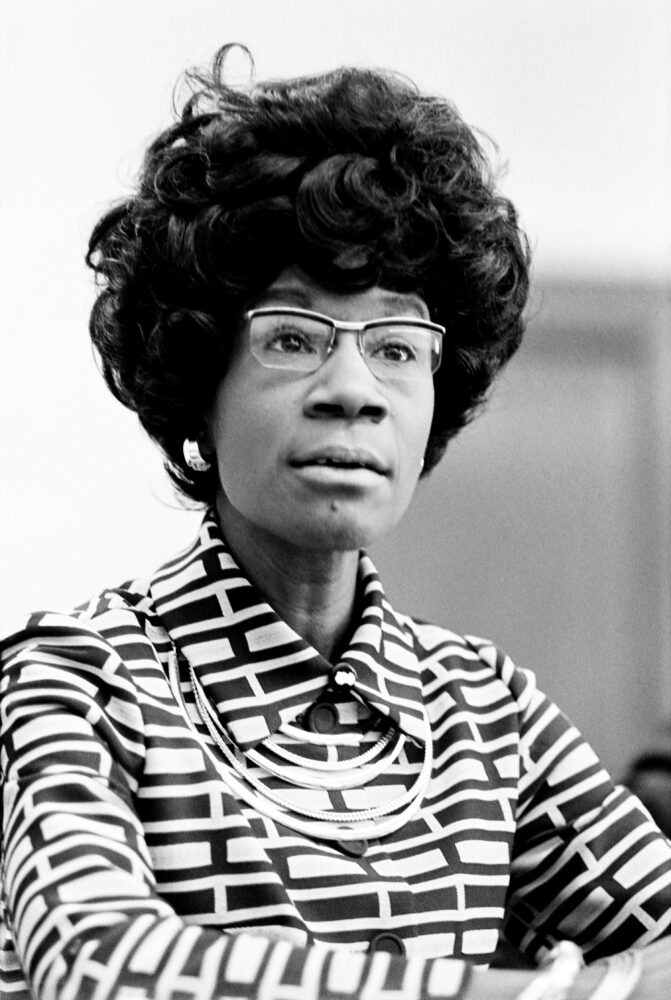Black History
Shirley Chisholm: First Black Woman In U.S. Congress

By Jaelyn Scott
Winter Intern
New Journal and Guide
Shirley Ann Chisholm was born on November 30, 1924, in New York City, New York. She was the eldest of four daughters and was born to immigrant parents. Her Father, Charles St. Hill, was born in British Guiana (Guyana) and was a factory worker. Her mother, Ruby Seale St. Hill, was born in Barbados.
As she grew up, Chisholm spent her time in both her predominantly Black neighborhood in Brooklyn, New York and her maternal grandmother’s farm in Barbados, as her parents worked to support the family during the Great Depression. She would go on to Brooklyn Girls’ High School with high marks and was accepted to Vassar and Oberlin College before she decided to attend Brooklyn college on a scholarship. She graduated cum laude from Brooklyn College, receiving a Bachelor’s in sociology.
After receiving her bachelor’s, she decided to work at a nursery school and became the director of two nursery schools while she studied at Columbia University for her Master’s degree in 1949. During that time, she would also marry her first husband, Conrad Q. Chisholm, a private investigator, and they would remain married until 1977.
Chisholm started to become very active in her community, especially when it came to political groups. From 1959 to 1964, she served as the Educational consultant for New York City’s Bureau of Child Welfare. She was also active with political groups such as the NAACP and her district’s Unity Democratic Club. Her political career started in 1964 when she represented the Brooklyn district in New York State Legislature.
However, four years later in 1968, she would make history as the first African-American woman to be elected to the House of Representatives, representing New York’s 12th Congressional District. She was inspired to do this after a court-ordered redistricting carved a new Brooklyn district out of her childhood neighborhood. Her opponent was a republican liberal named James Farmer, and she ended up winning with 67 percent of the vote.
During her time in Congress, she was initially assigned to the house forestry committee, but was then placed in the Veterans Affairs committee, and graduated to the Education and Labor Committee. She was known as a strong liberal woman who opposed weapons development and wanted to help end the war in Vietnam, and she also favored full employment proposals.
During her time in Congress, she also became a founding member of the Congressional Black Caucus and she helped found the National Women’s Political Caucus.
This would not be her first time making history, because in 1972 she made history once again when she became the first African-American Woman, and the second woman to ever run for President. She managed to get 152 delegates before deciding to withdraw from the race. However, her political career wasn’t over yet, as she was later elected the secretary of the House Democratic Caucus.
She would continue her career in Congress, becoming the first Black woman and the second woman to be placed on the Rules Committee in Congress, and later becoming a founding member of the Congressional Women’s Caucus in that same year. She would continue to make a name for herself in Congress until she would decide to retire in 1983.
But even after she retired from Congress, Chisholm didn’t stop working and decided to become a professor at Mount Holyoke College, and she was even a visiting scholar at Spelman in 1985. She was a prominent person in the community and was even invited back by President Bill Clinton to be the Ambassador for Jamaica in 1993, but she declined due to poor health.
In that same year, she was inducted into the National Women’s Hall of Fame, and she would win one more reward in 2015, when she posthumously received the Presidential Medal of Freedom award. She passed away on January 1, 2005, in Ormond Beach, Florida.














